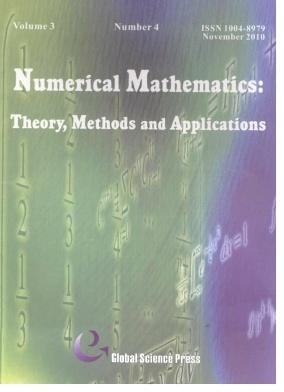Enhancing RBF-FD Efficiency for Highly Non-Uniform Node Distributions via Adaptivity
IF 1.8
4区 数学
Q1 MATHEMATICS
Numerical Mathematics-Theory Methods and Applications
Pub Date : 2024-05-01
DOI:10.4208/nmtma.oa-2023-0095
引用次数: 0
Abstract
Radial basis function generated finite-difference (RBF-FD) methods have recently gained popularity due to their flexibility with irregular node distributions. However, the convergence theories in the literature, when applied to nonuniform node distributions, require shrinking fill distance and do not take advantage of areas with high data density. Non-adaptive approach using same stencil size and degree of appended polynomial will have higher local accuracy at high density region, but has no effect on the overall order of convergence and could be a waste of computational power. This work proposes an adaptive RBF-FD method that utilizes the local data density to achieve a desirable order accuracy. By performing polynomial refinement and using adaptive stencil size based on data density, the adaptive RBFFD method yields differentiation matrices with higher sparsity while achieving the same user-specified convergence order for nonuniform point distributions. This allows the method to better leverage regions with higher node density, maintaining both accuracy and efficiency compared to standard non-adaptive RBF-FD methods.通过自适应提高高度非均匀节点分布的 RBF-FD 效率
径向基函数生成有限差分(RBF-FD)方法因其在处理不规则节点分布时的灵活性而受到欢迎。然而,文献中的收敛理论在应用于非统一节点分布时,需要缩小填充距离,无法利用数据密度高的区域。非自适应方法使用相同的模板尺寸和附加多项式的度数,在高密度区域会有更高的局部精度,但对整体收敛阶次没有影响,而且可能会浪费计算能力。本研究提出了一种自适应 RBF-FD 方法,利用局部数据密度达到理想的阶次精度。通过执行多项式细化和使用基于数据密度的自适应模版大小,自适应 RBFFD 方法可以得到具有更高稀疏性的微分矩阵,同时在非均匀点分布情况下实现相同的用户指定收敛阶数。与标准非自适应 RBF-FD 方法相比,这种方法能更好地利用节点密度较高的区域,同时保持精度和效率。
本文章由计算机程序翻译,如有差异,请以英文原文为准。
求助全文
约1分钟内获得全文
求助全文
来源期刊
CiteScore
2.80
自引率
7.70%
发文量
33
审稿时长
>12 weeks
期刊介绍:
Numerical Mathematics: Theory, Methods and Applications (NM-TMA) publishes high-quality original research papers on the construction, analysis and application of numerical methods for solving scientific and engineering problems. Important research and expository papers devoted to the numerical solution of mathematical equations arising in all areas of science and technology are expected. The journal originates from the journal Numerical Mathematics: A Journal of Chinese Universities (English Edition). NM-TMA is a refereed international journal sponsored by Nanjing University and the Ministry of Education of China. As an international journal, NM-TMA is published in a timely fashion in printed and electronic forms.

 求助内容:
求助内容: 应助结果提醒方式:
应助结果提醒方式:


